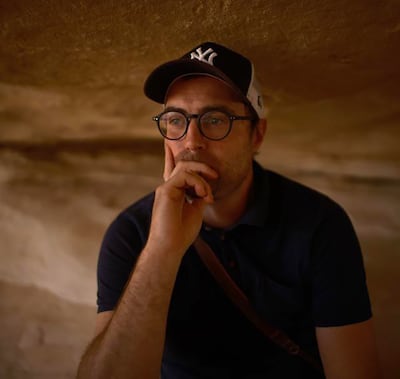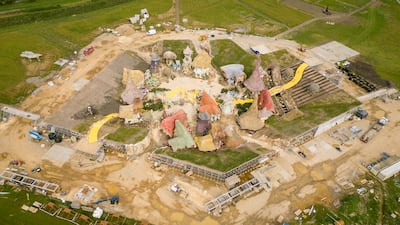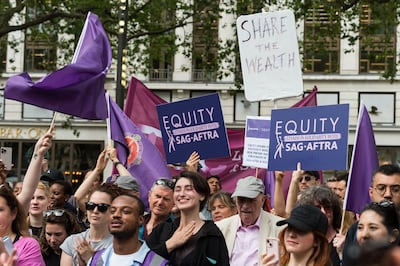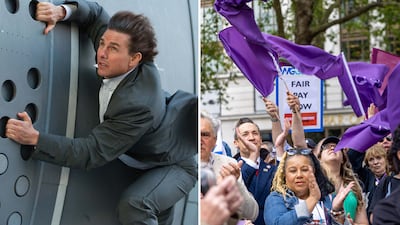It’s the start of the working day at Longcross Studios in Surrey and, with the last of the summer sun shining, actors and crew would normally be hard at work making the latest Mission: Impossible film.
When The National paid a visit, however, the film and television production facility appeared deserted, with progress on the eighth instalment of Tom Cruise’s blockbuster franchise at a halt, as the Hollywood actors and writers strike grinds into its 17th week.
The dispute began when the Writers' Guild of America (WGA) went on strike at the beginning of May after their demands for better pay and protections against the future use of artificial intelligence in television and films were not met.
The Screen Actors Guild-American Federation of Television and Radio Artists, or SAG-AFTRA, which represents 160,000 performers, including A-list stars, then followed suit for similar reasons.
The joint strike is the first since 1960, when the WGA again led the way and was joined by SAG, headed at the time by future US president Ronald Reagan, who negotiated a deal with the studios for improved earnings and pensions for his union's members.
While the pipeline of new work from actors and writers is blocked, the army of people who help to make the magic come to life have also found themselves in a state of limbo as a result of the strike.
The UK, the third-largest centre for movie production in the world, has been particularly badly hit by the strikes, with thousands of workers, almost all of whom are freelance, laid off.
While Britain's performing arts and entertainment trade union, Equity, has staged protests in sympathy with its US counterpart, it is prevented from striking under laws that forbid “secondary action” aimed at supporting other walkouts.
From costume designers to electricians and caterers, the impact of the strike has been felt across a spectrum of film industry workers and suppliers outside the United States.
One employee at Longcross told The National that a flurry of film workers would ordinarily be seen on the now “much quieter” roads.
Elsewhere, Pinewood Studios is said to be “empty” after filming on Deadpool 3 came to a halt, while aerial images show the abandoned set of the film version of the musical Wicked at the Ivinghoe Movie Lot, in Buckinghamshire.
One of those affected by the strikes is Charlotte Sewell, an assistant costume designer, who has been based at Longcross while working on Mission: Impossible – Dead Reckoning Part Two.
Due to the strike rules, she can prepare costumes but can have no interaction whatsoever with actors, which has cut her working week down to one day.
Ms Sewell told The National that “morale is pretty bad” among colleagues in the film industry after the “real shock” of being told they were being laid off.
“Everyone was just reeling from it,” she said. “There were people in tears saying: ‘What am I going to do?’
“For people who’ve not been in the industry that long, emotionally it’s really hit them because they came into the industry when it was at its height and have never known a day out of work.”
The strikes had come at a bad time because summer is the main earning period of the year and July also saw the arrival of the “nasty” tax bill, she explained.

Despite the financial repercussions from the strikes, Ms Sewell has sympathy for the actors and writers.
“They wouldn’t have taken the decision lightly. All actors want to do is work. Their egos want them to work and they enjoy their work so the last thing in the world to do is strike.
“We want a speedy resolution. But we all understand that they’re fighting for better terms and conditions against big studios.”
Duncan Broadfoot, 41, a supervising location manager with two decades' experience, is not working due to the strike.
“By its nature, strike action causes collateral damage and film crews around the world have formed a large part of this collateral damage,” he said.
There had been understandable focus on the impact in the US but “the ripples are being felt all around the world”.
Mr Broadfoot said the impact of this strike is much more pronounced in the UK than the previous one of 2007, when writers walked out for 14 weeks.
“The film industry wasn't as developed as it is now and it’s terribly dependent on US studios now, so there’s a bigger effect this time,” he said.
When those in the film industry are in work, pay can be relatively generous, though it is offset by the precarious nature of the employment and the need for individuals to pay National Insurance and pension contributions out of their own pockets.

Recent years have been good to the British film industry thanks to generous tax breaks and the ready availability of experienced and talented crew.
In 2022, investment by Hollywood of £5.37 billion ($6.78 billion), according to figures from the British Film Institute, allowed businesses to flourish, including FBFX, a supplier of special effects costumes to the film and TV industry, which employs around 70 permanent and freelance staff.
Director Grant Pearmain, 54, told The National that business had been extremely busy for many years and “at this point, we would be expecting to book new work in and starting new projects, but obviously none of that is happening”.
director of FBFX
“The plan is to keep going. We’ve gone through a lot of trials and tribulations over 30 years but, like any business, there’s only so much you can go on when you don’t have any income.”
Mr Pearmain, who has a partner, three children and a mortgage, fears the worst.
“People will lose houses, people will lose businesses,” he said.
“There are people in the industry who are talking about the end of their careers if it goes on too long. It could all come crashing down. There’s no safety net for any of us.”
For Vince Jordan, who runs Crew Catering, the strike may spell the end of his time in the film industry after nearly 40 years in the business.

He would normally employ around 50 people when working on a film, but they have now been forced to look for alternative income.
“I’ve personally never experienced anything like this – it really is bad,” he told The National.
“I’ve lost two jobs already and I personally don’t think that I’m going to work again this year.
“My wife and family told me to give it up years ago but the film industry is like a drug. I’m 60 this year and I’m keeping the business but I’m going to it hand over to my boys. I’ve had enough.”
The recent experiences of film industry workers has contributed to an 800 per cent increase in applications to the hardship fund of the Film and TV Charity last month, compared to the same time last year.
The charity gives out grants of between £500 ($630) and £750 ($948) and has added £500,000 ($630,000) to the fund.
Spencer MacDonald, national secretary of the Bectu union, which represents workers in film, TV and theatre, said according to some estimates as many as 10,000 people have been affected.
“I was at Pinewood Studios the other day and normally it would be buzzing, but it was empty and everything was locked up. There was tumbleweed blowing through it.”
He said there was a “real danger those with transferable skills will leave”, delivering a major blow to the UK film industry at a time when it had been looking for 20,000 new workers to expand over the next five years.

As well as obvious concern about the well-being of film industry workers, there are also fears about the long-term impact of the strike on the financial health of the industry.
Tim Richards, the chairman of the BFI, as well as the founder and chief executive of Vue cinemas, said there was a supply issue in the industry in the wake of Covid.
“Our post-Covid recovery was certainly slower than anyone in the industry was expecting due to supply issues, so the timing of the writers’ strike and now the actors’ strike has been very unfortunate,” he said.
“We’re hoping there’s going to be a quick resolution on both because what this industry and our audiences need are new movies as when the films are there the audiences will come. In the UK and Ireland, we’ve just seen our best week ever for Vue admissions when Barbie and Oppenheimer opened.”
In the meantime, Ms Sewell waits every Thursday to be told if there’s enough work to require her presence at Longcross. “The one day a week I have is hanging by a thread,” she said. “It’s worrying times.”


